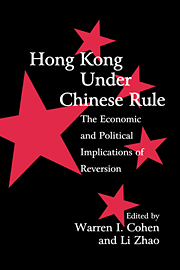Book contents
- Frontmatter
- Contents
- List of Contributors
- Introduction
- 1 Hong Kong as an International Commercial Center
- 2 Cooking the Rice without Cooking the Goose: The Rule of Law, the Battle over Business, and the Quest for Prosperity in Hong Kong after 1997
- 3 Hong Kong Faces 1997: Legal and Constitutional Issues
- 4 The Economic and Political Integration of Hong Kong: Implications for Government–Business Relations
- 5 Hong Kong and Greater China: An Economic Perspective
- 6 One Country, Two Currencies: Monetary Relations between Hong Kong and China
- 7 Political Participation in Hong Kong: Trends in the Mid-1990s
- 8 Strategic and Military Implications of Hong Kong Reversion
- 9 Hong Kong and China's Integration into the International Community
- 10 Hong Kong as a Problem in Chinese–American Relations
- 11 Post–July 1997 Challenges
- Index
11 - Post–July 1997 Challenges
Published online by Cambridge University Press: 22 March 2010
- Frontmatter
- Contents
- List of Contributors
- Introduction
- 1 Hong Kong as an International Commercial Center
- 2 Cooking the Rice without Cooking the Goose: The Rule of Law, the Battle over Business, and the Quest for Prosperity in Hong Kong after 1997
- 3 Hong Kong Faces 1997: Legal and Constitutional Issues
- 4 The Economic and Political Integration of Hong Kong: Implications for Government–Business Relations
- 5 Hong Kong and Greater China: An Economic Perspective
- 6 One Country, Two Currencies: Monetary Relations between Hong Kong and China
- 7 Political Participation in Hong Kong: Trends in the Mid-1990s
- 8 Strategic and Military Implications of Hong Kong Reversion
- 9 Hong Kong and China's Integration into the International Community
- 10 Hong Kong as a Problem in Chinese–American Relations
- 11 Post–July 1997 Challenges
- Index
Summary
THE Basic Law, the constitution for post–July 1997 Hong Kong, carefully balances the requirements of maintaining Hong Kong as a separate political, economic, and social system against the need to assert Chinese sovereignty. The resulting mix of elements may succeed in attaining both goals. It requires that the Chinese in Hong Kong play the predominant political role there, and that they generally be individuals who have not acquired right of abode elsewhere. It also gives tremendously important prerogatives to Beijing in terms of appointing – or approving the appointments of – key individuals, conducting the Special Administrative Region's (SAR's) foreign and defense policies, and retaining the authority to amend the Basic Law in the future. Yet it contains numerous provisions that explicitly assure continuation of Hong Kong's distinctive system in everything from legal affairs to social issues such as freedom of religion and freedom of the press. Only future developments will tell whether the Basic Law will be implemented in a way that preserves Hong Kong's system.
The Western media, when discussing this issue, have tended to focus on a small number of very high profile issues, such as the choice of a Chief Executive, China's decision to replace the legislature, and potential curtailment of freedom of the press. These issues unquestionably are important, and they warrant serious attention. If the People's Republic of China (PRC) should significantly curtail press freedom, for example, this would badly shake confidence in China's ability to keep its word when dealing with the sophisticated, open society of Hong Kong.
- Type
- Chapter
- Information
- Hong Kong under Chinese RuleThe Economic and Political Implications of Reversion, pp. 229 - 244Publisher: Cambridge University PressPrint publication year: 1997

